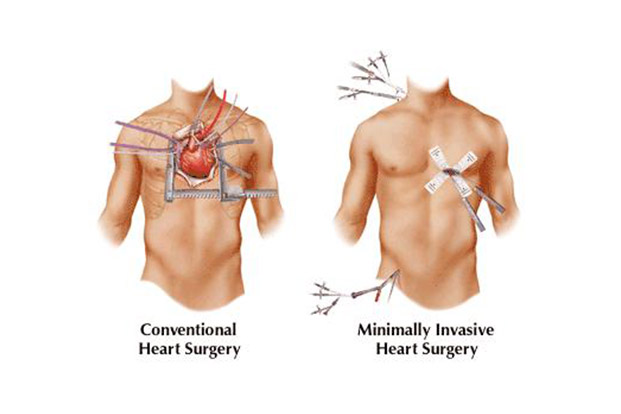MICS – The New Type of Cardiac Surgery
Apr 19, 2022
Dr SK Sinha, Director Cardiac Sciences is a renowned cardiac surgeon who has the experience of performing more than 9000 cardiac surgeries of varying complexities. He is also responsible for introducing a new revolution in cardiac surgery- Minimally Invasive Technique (MICS).
A methodology to provide a No Scar Cosmetic Cardiac Surgery Procedure
- What is minimally invasive cardiac surgery (MICS)?
Minimally invasive heart surgery (also called keyhole surgery) is performed through small incisions (on the sides of your chest), by using specialized surgical instruments. The incision used for minimally invasive heart surgery is about 2 to 3 inches instead of the 6 to 8 inch incision required for traditional surgery. In this surgery the CTVS surgeons operate on the heart between the ribs and hence do not split/divide the breast bone for heart access. This helps the surgeon by giving him a better view of the heart than open heart surgery and helps the patient as it reduces pain and guarantees quicker recovery. A heart-lung machine is also not needed for this surgery, and a device is attached to your heart to stabilize it. The best aspect of this surgery is a slight cosmetic scar, early discharge and mobility experience.

- Is minimally invasive surgery the right choice for me?
Technology & advancements in science are to make our life easier. It is essential for us to embrace the developments. MICS is a novel safe and broadly applicable technique for performing a wide range of complex heart procedures, including single or multiple heart valve procedures, bypass surgery, congenital heart repairs, and reoperations. At Paras Hospitals, the CTVS department has a cumulative experience of performing more than 500 minimal invasive cardiac surgeries on patients from all over the world. If one has been advised cardiac surgery and wants faster discharge, easy mobility and less trauma, then one should definitely opt for the same. Then again, who wouldn’t want such an option that saves you from the perils of a traumatic conventional cardiac surgery?
But it should also be noted that not everyone is a candidate for these surgical techniques. The CTVS surgeon will review the results of your diagnostic tests before your scheduled procedure to determine if you are a candidate for minimally invasive surgery. The surgical team will carefully compare the advantages and disadvantages of minimally invasive techniques versus traditional surgery techniques.
- What do you feel are the key patient benefits for a minimally invasive cardiac surgery?
The benefits of minimally invasive cardiac surgery techniques are many, few are mentioned below:
- Small scars- in women the same can hide below the breast
- Smaller incisions
- Less pain and trauma
- Shorter ICU and hospital stay after surgery: The average stay is 3 to 5 days after minimally invasive surgery, while the average stay after traditional heart surgery is 7 to 10 days
- Low risk of infection
- Low risk of bleeding and blood transfusion
- Quicker return to normal activity
- Shorter recovery time and faster return to normal activities/work: The average recovery time after minimally invasive surgery is 1 to 2 weeks while the average recovery time after traditional heart surgery is 6 to 8 weeks.
- Division of the breastbone is not needed.
To know more email at [email protected]


.jpg)
.jpg)




